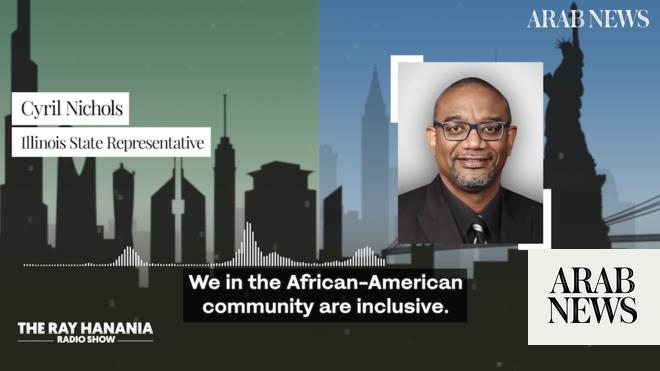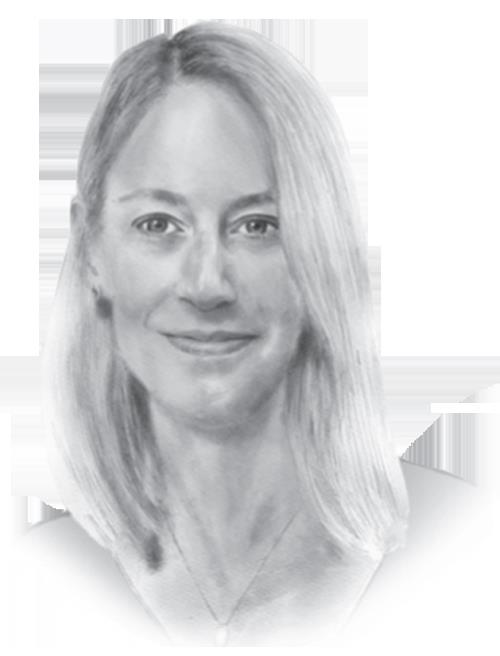
Equitable ties needed in Illinois, a leading Black legislator said on The Ray Hanania Radio Show sponsored by Arab News
Illinois’ only two Muslim legislators, one who is Arab, should join the Black Caucus, said State Rep. Cyril Nichols
CHICAGO: African Americans are perplexed that Arab Americans want to be identified as being “Middle East and North African” on the US Census yet fail to balance the support Blacks have given to the Arab community in the country, a leading Black legislator in Illinois said Wednesday.
Illinois State Rep. Cyril Nichols — a member of the state’s large African-American legislative caucus of 21 members, which represents nearly one-third of the Democratic Party’s contingent — said African Americans support their counterparts twice as much in comparison to what they receive in return.
During an interview on The Ray Hanania Radio Show, broadcast on the US Arab Radio Network in Detroit and Washington D.C. and sponsored by Arab News, Nichols said “an imbalance exists” and it “needs to change.”
“When we work together, we can accomplish so much in a short amount of time. As you may know, about 70 percent of the gas stations in my district are owned by Arab Americans. We are not reinvested,” Nichols said.
“But the African-American community is reinvesting by doing business (with Arab businesses) in those areas where these gas stations (are located) and any other businesses for that matter. We in the African-American community are inclusive. We allow anyone to open up, be it Chinese food restaurants — it could be the gas stations, it could be cleaners. Oftentimes it is not African Americans that own these businesses. We just have to have a real conversation.”
Asked to define the imbalance, Nichols said that on a scale of one to 10, African-American support of Arab Americans is at 10, while in return it is “an even five.”
To achieve some “balance,” Nichols told Arab News he would convene a Town Hall-type meeting in October to bring the two communities together in Illinois. He said it should also be done in other areas with similar demographics.
“When we are in our communities, because we don’t talk about it enough, because we want to bring in cultural identifiers that are not our culture, there are certain people who don’t want us to work together,” Nichols said, and expressed hope that Arab Americans and Muslims would attend.
“When we work together, there is nothing we can’t do. There is literally nothing we can’t do. That is the way a community prospers, when people work together. Yes, there is not enough conversations. We should be meeting and convening weekly.”
Nichols added: “We really need to bring people of leadership together, be it principals, be it business owners, be it clergy. We really need to come together, not to have a gripe session, but to have a real honest discussion with a solution. So, I don’t just want to come in and talk about nothing. I want to come in with a solution and develop legislation to support the solutions that we come up with. That’s the difference.”
He said there was a long history of relations between Arab Americans and African Americans, citing several key milestones in this regard.
In 1983, Chicago’s first Black mayor, Harold Washington, created the Advisory Commission on Arab Affairs, and placed several Arab Americans in key city positions, Nichols said. The commission was dismantled by former Jewish-American mayor, Rahm Emanuel, immediately after his election in 2011.
Emanuel’s successors, former mayor Lori Lightfoot and incumbent Brandon Johnson, said they would reinstate the Arab Advisory Commission but this has not happened.
In 1984 and 1988, the Rev. Jesse L. Jackson gave Arab Americans roles in his attempts to become the Democratic Party candidate for president. Although Jackson did not win the party’s nomination on both occasions, Arab Americans won seats as convention delegates and had roles in defining the party’s national-issues plank.
In 2022, Nichols introduced draft legislation seeking to recognize Arab Americans as a “minority group,” to qualify them for the Illinois Minority Business Enterprise system — that gives MBE members a first shot at up to 30 percent of the state’s annual contracts worth billions. This status has strengthened the businesses owned by Blacks, Hispanics, women and Asians, but Arab businesses have been left out.
Nichols noted that instead of supporting the bill, which has not been signed into law yet, many Arab Americans were apathetic.
“Both communities should be getting a lot more. If we work together we will, we will get a lot more. We have to work together. We have to stop some of these petty (people),” Nichols said, referring to individuals and groups that reject an inclusive approach.
The 32nd District that Nichols represents has more than 120,000 residents, with a large Arab-American population on Chicago’s southwest side and various suburbs, including in Bridgeview where Arab immigrants built the state’s first prayer hall, the Mosque Foundation, in 1981.
Last year, Nichols secured a state grant of $120,000 to support the Mosque Foundation’s Food Pantry which helps all needy families.
Nichols said that nearly one-third of the state’s 78 Democrats in the 118-member Illinois General Assembly are African American and that only two members are Muslim — Nabeela Syed and Abdelnasser Rashid.
Nichols said Rashid, who has Palestinian roots, and Syed, with Indian ancestry, should “absolutely” join the Black Caucus to address issues facing all the minority communities.
“This is a very serious and real topic,” Nichols said. “When I look back and I think of this country, Black folk built this country. To think that our communities don’t work together more, then you are dealing with the idea of systemic racism, thinking that somehow your community is going to jump the Black community.
“Our community has never thought of ourselves being first, second or third. We are just inclusive. And it is proven. We’re not making this up. It is proven. If we would just learn to work together and believe in what we worship, which is God, a lot of this stuff would not be issues. These issues we deal with are all man-made. These are not God-made issues. These are man-made issues,” Nichols said, adding that Blacks and Arabs can find common ground in terms of their religious beliefs and the struggle against racism.
Nichols’ comments were made during an appearance on The Ray Hanania Radio Show broadcast Wednesday Aug. 2, 2023, in Detroit and Washington D.C. on the US Arab Radio Network and sponsored by Arab News.
You can listen to the radio show’s podcast by visiting ArabNews.com/rayradioshow.












